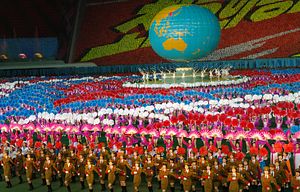Students of North Korea are being introduced to a wealth of new data, much of which comes from sources actually from North Korea. The effect, as I argued yesterday, has been to give “voice” to those who have for a long time been without. However, as important as it is to give voice to the formerly voiceless, there are intellectual hazards couched in the sudden influx of new data into a field of study that has for so long suffered from a dearth of information. Christopher Green, in “New Era, New Challenges: North Korean Analysis on Virgin Soil” addresses this issue head-on and offers some advice to those in the field of North Korean studies.
There is a “human tendency,” notes Green, “to perceive something as new when, in truth, it was simply not visible before.” [italics in original] In other words, because the public only just started listening to defector voices carefully, what they say tends to come across as new. But this is a bias inherent in the listener, not the world. With a “torrent flooding down upon the Internet-savvy public,” the role of theory becomes much more important. Similar to the role theory plays in interpreting “big data,” the literature on the “politics of authoritarianism” is bound to play an increasingly important role in explaining regime durability and indicating how to understand the dynamics of North Korea’s “personalist-party regime,” among other things. Further along in the article, Green uses the literature on the politics of authoritarianism to provide a deeper analytical interpretation of the Jang Sung-taek purge and the intra-elite feud between Hwang Pyong-so and Kim Won-hong than one might find elsewhere.
The use of comparative study grounded in highly developed theory is what will prevent the essentialization of North Korea – that is, the conclusion that North Korea’s political system is somehow unique and unable to be compared to other systems. Sui generis is always, everywhere a dangerous claim. This is where the comparative perspective, in addition to the use of good theory, is helpful. Indeed, there is much wisdom in comparison. Stephan Haggard, in a recent article on the “purge” of Choe Ryong-hae and the rise of Hwang Pyong-so, shows how the comparative perspective might be employed to study the Organization and Guidance Department (OGD).
Haggard takes issue with notion that “Kim Jong Un is little more than a puppet of… the OGD.” He points out that “every Communist party has the equivalent of an organization and guidance department that is responsible for controlling the recruitment and promotion of personnel – including the military – and communicating key decision[s] down the chain of command… as in China’s Politburo Standing Committee.” He then asks, rhetorically, “Does anyone think that Mao, Deng, Stalin or Xi Jinping… are beholden to their GDB-equivalents?” More likely, he suggests, “the personnel in these roles are trusted advisors who have access to the leadership and work with it….” For every article that says the OGD is in charge, another finds that “Kim Jong Un is in total control.”
Certainly, the opaque nature of North Korea’s governing elite make definitive conclusions about who governs quite difficult, if not impossible. Again, Haggard is instructive: “the main point is not whether the OGD or Kim Jong Un is in charge…. It is [the] broader configuration of forces that in conjunction tells us what the regime is about.” In other words, how do the multitude of organizations (the OGD just one among many) interact with one another? What is the relationship between the party and the military (an extremely important relationship)? The military and the security agencies? And so on. While one may take issue with Haggard’s belief that “No one has a good model of how the North Korean political system works,” he is right to point out that an overemphasis on the top brass overshadows the complexities of inter-organizational interaction.
Obsessing over who governs North Korea obfuscates a deeper appreciation of the direction the field of North Korean studies is heading. New sources of information from those actually from the country being studied and a careful consideration for instances where a comparative approach, rooted in developed theory, can help put things in perspective can open up avenues for inquiry and, if executed well, edifying answers. As Green notes in the article cited above, “North Korean Studies is being dragged kicking and screaming toward a new dawn.”

































